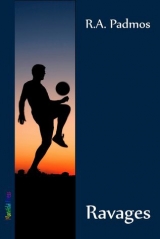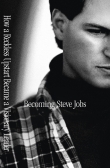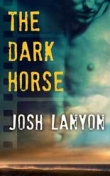
Текст книги "Ravages"
Автор книги: R.A. Padmos
Жанры:
Слеш
,сообщить о нарушении
Текущая страница: 18 (всего у книги 18 страниц)
small part of my arm that could be touched when my body was untouchable. For using your voice to
defend me, even when you didn’t know yet I was worth your trust. For letting me work my arse off. For
working your own arse off even more. For everything that is you.
Daniël kisses him. “I love you, and that’s that.”
Epilogue
Daniël looks at the visitor. “I had expected you much sooner.”
Death doesn’t react.
“I see: talkative as ever. And you still don’t look like a boy or a girl and you could be any age.
I bet white people see you as white and black people as black. Even though there isn’t really much to
see. Real clever.
“You’re in a hurry? Nah, didn’t think so. The work gets done, no matter what. Cancer is as
good a vehicle as old age and it’s not like we get much choice anyway, is it?
“It’s been a while since we last met. Stupid young thing I was. Berserker. Making demands
like I had any say in the matter.
“Years later, I seriously started to wonder what would have happened to me if he hadn’t made
it. Every possible scenario passed through my mind, from a death by overdose to being married to a
woman and having a couple of kids. But then I realised I wasn’t able to imagine life without him. It
simply wasn’t there, no matter how hard I tried and how honest I was with myself. I had managed the
first 23 years without him just fine and from one moment to another, it stopped being an option. It
refused to become real, even in my own head.
“Last year we celebrated our fiftieth anniversary. Or was it the year before that? It was around
the time there was this documentary about us shown on TV, or whatever they call it these days. Had
some footage from when we were both still playing for Kinbridge Town. We hadn’t looked at any
pictures from that time for years, but it didn’t hurt watching it. It was sweet seeing my Steve from
before. To see the other guys as well. But I had to watch a second time before I noticed anyone but
him. So young, all of us...
“We told our story between the footage. Steve was a bit shy about it. He never likes to talk
much; prefers to keeps himself in the background. But for Arnaud Degaré’s eldest granddaughter, he
made an exception. That’s perhaps because we already knew her well, her being married to an English
journalist. Lovely girls, both of them. Expecting their first one any day now.
“Been quite a few years since the gaffer died. He could be harsh as a manager. Never lost any
sleep over the choices he made, I bet. But to me, he would always be the man who phoned me because
he understood the passport photo the police had found in Steve’s wallet; who gave me a chance to
fight my way back into the first team. Much later, I heard one or two individuals on the board had
wanted to get rid of me. Sell me off at whatever price to any club that was willing to pay. He fought
them. I played until I was past thirty. We won the Premier League once, some other trophies and
silverware. I had some good matches with Oranje too. As a footballer, there was nothing left to prove
for me. It was time for something else.
“She brought us to the park where it had happened, but he didn’t recognise any of it. It was just
a place in a city. Seeing our first house again was nice, though. Totally changed, of course, but it
brought back some sweet memories. They filmed the other houses too. There weren’t that many. He’s
never been an adventurous one, my Steve. He liked visiting our little summer home in Holland,
though. He adores our nieces and nephews; and later, their children. And they, in return, adore him.
Same goes for the kids of our friends. They recognised instinctively his gentle, never-judging soul.
His patience that would put most saints to shame. He once made a joke about it, told me he was
simply too slow for quick judgement.
“It’s so much more than that. His gentleness could drive me crazy at times. How he simply
waited until I was done ranting and smiled while I picked up the pieces of yet another broken plate. He
made me coffee when I returned from an angry run in the pouring rain. I always told him where I was
going and why. He never had to worry about me, even if I have to admit I wish I had been a kinder
man during some periods of our marriage.
“There were these nightmares. I never understood why they happened to me, but never to him.
Until I dragged myself to a therapist for a few talks and in the end found my own answer. He could
have died, but I would have lost him.
“You understand why I had to claim him, don’t you? He had to know I was there, fighting at
his side, no matter how powerless I was in reality.
“It all passes somehow: time and the knowledge that we stand empty-handed in this life, the
anger and the sorrow, the regrets and the victories. He learned to live with his body. With the fact that
he couldn’t drive a car or ride a bike. Couldn’t talk like before. Couldn’t run or even walk more than
short distances. Couldn’t read at full speed, though that didn’t prevent him from reading more than I
ever did. But getting rid of his crutches was a milestone. And I learned to be patient, to stop taking
tasks out of his hands because I could perform them twice as fast with less than half of the energy and
effort it was costing him.
“He never missed even one of my home games and did see most of the away ones, too. I hated
the nights away from home, but it was good to run out on the field for the stretches and see him sitting
there. Him being a guy and having played for Kinbridge Town meant he was allowed in the dressing
room after the game. He always sat quietly on one of the benches, listening to whoever needed
listening to, always finding reasons to give out a compliment or two. But he left the sometimes muchneeded
criticism to the gaffer. I know he would have stayed out if even one of the guys had as much as
hinted they didn’t want him there. No one ever did, not even the new ones, who had never played with
him.
“He still enjoyed the sport, followed it enthusiastically even after I stopped playing. He wrote
down his thoughts about it. I had to really talk him into publishing them. But he stopped at interviews
and public appearances. Still, there can’t be many footy fans or players who haven’t read his first book
in the past 40 or so years. The Art and the Skill became a classic. His second and third book did very
well, too.
“And then there was of course his work for charity, but he doesn’t like me to talk about that, so
I won’t.
“It took me a while to find my niche after I stopped playing. Not having much of a talent in
that direction, I decided against getting my trainer’s licence. But I wanted to stay connected to the
sport, so I taught myself photography. Realised my technical shortcomings and followed some
courses. I discovered I wasn’t one for the fast work during matches, but portraits turned out pretty
fine. I had a several exhibitions, lost count of the magazines that placed my photos, published a dozen
books. He wrote the text for all of them, because he understood better what I was trying to say than I
did. His words gave meaning and depth to the photos I made, beyond the obvious. If I liked the idea, I
did commercial work. Can’t say I ever did something just for the money. That’s real luxury.
“He always supported me in everything. Travelled with me, even if he didn’t like it, so I
avoided that as much as possible. I ended up with my own studio. He was involved in every stage of
my work, from finding ideas to the selection of the final photos. I never did anything without talking it
through with him. Often he sat quietly in a corner when I worked, observing. He put the boys at ease
by simply being there.
“Sometimes I worked outside my studio. I’m rather proud of my after defeat series, not in the
least because it formed such a perfect symbiosis with Steve’s accompanying text. I simply told the
first one to stand against the nearest wall, right after they had lost an important match. Shot a few
pictures, then grabbed the next one. I did the same with every team in all the English professional
football competitions and tournaments. You get the idea. It was all still there: the mud and grass, the
bruises and the tears, the anger and the resignation. How much alike they all looked, and how totally
different. Good boys they were, all of them.
“By that time, I was old enough to be the dad of some of the younger boys. No, I never missed
having children of my own. The Borghart genes have been well taken care of, even without my
personal contribution.
“We saw most of them back at our fiftieth, the boys of our team. Francesco, Dag, Neil, Ray,
Kurt...They had travelled from all over the world to be with us. Of course, you remember picking up
the gaffer and Niko. Soon after the reunion, you got Anthony too. He had been ill for a while, but
never told anyone about it.
“Neil and I stayed good friends after we both retired. Steve and I are godparents to his
youngest boy. The lad became a good defender, too. Sweet character, just like his dad. Saw quite a bit
of Gabrysz as well. Heart as big as the world.
“You already know about Gael and Matthew. There had been promises they would never crash
another plane for how many years now? You mean before that crash? Three more years they visited
our home, to take off their masks for a few hours. Then, one day, they made their decision. This time
it wasn’t about an innocent man being almost beaten to death and his faithful, loving boyfriend. No, it
was about the skipper, a local boy. A married man cheating on his wife with another in-all-but-name
married man. Family men. They were buried under the same ugly mess as Steve and I had been a few
years before that, but with a lot less goodwill.
“But when fans started to make jokes about how Matthew had broken Francesco’s heart, we all
knew the storm had died down. They got married, stayed the loving parents they had always been.
They stopped playing soon after, neither of them wanting to end their careers at another club. Both
stayed very much involved with Kinbridge Town. Matthew started training the young lads. He had
some fine results with them, too. Gael became a writer and analyst.
“They grew old together and tasted the joy of becoming grandparents. They died together. And
I miss them so much.
“I took a picture of my Steve on every single one of our anniversaries and one with the two of
us while we’re looking in a mirror. I made a book out of it, a gift for our friends and family. Dan and
Steve, A portrait, it’s called.”
Daniël looks at the sleeping man beside him, and leans forwards to kiss his forehead.
“He has been the only one for me for half a century. I never even looked at another man. His
body has been my home during all those years. My anchor. And I, by whatever undeserved miracle,
was his all.
“Is this my final lesson, that love is what remains when all is said and done?”
Death takes a step forward and stretches its hand out.
“If you want him, you will have to go through me.” Steve takes his husband in his arms,
shielding him. “You can take me too; I’ve already been blessed beyond what I could have hoped for
when he chose to love me. The two of us or the deal is off.
“He is my beloved and my friend. I stake my claim.”
Death makes its move.
***
Author's notes
The Steve Gavan song in chapter 3 is by Joanne Morris.
Bible quotes in chapter 2 are from The Song of Songs; those in chapter 33 from the book of
Ruth.
About R. A. Padmos
In case anyone wondered, yes, I’m female.
I’ve lived all my life in or around Rotterdam. And 30 of those years I shared with my wife. Our
little family also has two sons and five cats.
I started to write stories when I was nine or ten, and haven’t stopped ever since. I've published
a novel and other fiction and non-fiction but the internet changed everything because I discovered
there’s a lot more women (and quite a few men) interested in reading and writing male/male stories.
And so Ravages happened.








